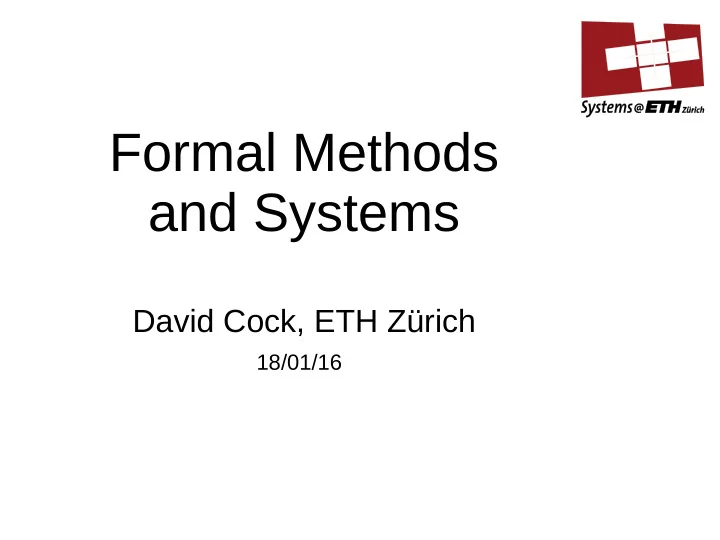

Formal Methods and Systems David Cock, ETH Zürich 18/01/16
Overview ● Correctness challenges in Barrelfish. ● System configuration using SAT. ● Tracing and online invariant checking. ● Better languages for Systems. 18 January 2016 Industry Retreat 2016 2
The State of the Fish 7 architectures: OMAP44xx, ● ARMv7/GEM5, X-Gene 1, ARMv8/GEM5, Xeon Phi, x86-64, x86-32 42 applications + 51 test apps ● 9 languages ● 32 committers ● 9 years old ● > 1.1M lines of code ● This is no longer a small research project! We're starting to see the engineering challenges of a large system. 18 January 2016 Industry Retreat 2016 3
Getting It Right A lesson from history: It's easier to prove code correct, if it actually is correct! ● We embarked on a new port last year: ARMv8. ● This forced us to face some codebase “challenges”. ● We now support fewer platforms, more thoroughly. ● We now make a core vs. non-core distribution. ● Proper debugging is coming (more later). 18 January 2016 Industry Retreat 2016 4
SAT Solving and the SKB 18 January 2016 Industry Retreat 2016 5
Handling OS complexity ● System Knowledge Base Hardware data and specifjcation – Hardware info – Runtime state ● Rich semantic model – Represent the hardware – Reason about it CLP solver CLP solver – Embed policy choices (Prolog + (Prolog + constraints) constraints) Runtime system information 18 January 2016 Industry Retreat 2016 6
What goes in? ● Hardware resource discovery – E.g. PCI enumeration, ACPI, CPUID… ● Online hardware profiling CLP solver CLP solver (Prolog + (Prolog + constraints) constraints) – Inter-core all-pairs latency, cache measurements… ● Operating system state – Locks, process placement, etc. ● “Things we just know” – SoC specs, assertions from data sheets, etc. 18 January 2016 Industry Retreat 2016 7
Current SKB applications ● General name server / service registry ● Coordination service / lock manager ● Device management CLP solver CLP solver (Prolog + (Prolog + constraints) constraints) – Driver startup / hotplug ● PCIe bridge configuration – A surprisingly hard CSAT problem! ● Intra-machine routing – Efficient multicast tree construction ● Cache-aware thread placement – Used by e.g. databases for query planning 18 January 2016 Industry Retreat 2016 8
Prolog + SAT ● There are limits to what Prolog will efficiently solve. ● Address allocation under alignment constraints e.g. PCI, is better expressed in terms of bits. ● SAT solvers have gotten really good lately. ● Can we express PCI bridge config as SAT ( yes! ). ● Can we put a SAT solver in the SKB ( research! ). 18 January 2016 Industry Retreat 2016 9
Tracing for Invariants 18 January 2016 Industry Retreat 2016 10
HW Tracing for Correctness Are HW operatjons right? 5Gb/s unmap(pa); cleanDCache(); flushTLB(); Filter at line rate ● Real time pipeline trace on ARM. ● Can halt and inspect caches. ● HW has “errata” (bugs). ● Check that it actually works! ● Catch transient and race bugs. Check temporal Log & process offmine assertjons 18 January 2016 Industry Retreat 2016 11
HW Tracing for Performance • Should see N coherency messages. 5Gb/s • Do we? ‐ The HW knows! Filter at line rate Is URPC optjmal? Cache 0 x 1 1 INVAL(0) URPC[0]= x; READ(1) URPC[1]= 1; … x Core 0 Cache 1 while(!URPC[1]); x= URPC[0]; Log & process offmine 2 18 January 2016 Industry Retreat 2016 12 Core 1 12
Online Example: LTL to Büchi ● LTL(-ish) formula: A store on core 1 is eventually visible on core 2. ● Think regular expressions for infinite streams. ● As for REs, we compile a checking automaton. ● Run the automaton in real time and look for violations. 18 January 2016 Industry Retreat 2016 13
Could We Trace a Rack? ● Barrelfish is aiming for rack-scale single- image systems. ● We'll rely on a lot of coordination and consensus algorithms. ● It would be really useful to debug these noninvasively. ● 64 SoCs x 5Gb/s = 320Gb/s trace output. ● That'll need some data reduction, but it's very feasible. ● Online checkers (e.g. automata) will be essential at this scale and up. 18 January 2016 Industry Retreat 2016 14
Languages
Languages and Formal Methods ● Practical kernels are C/C++/ASM ● Some things we might like: – First-class messaging (Go) – Specifying layout (Rust) The hard part about reasoning about “C”, is that we keep stepping outside the language.
What Should We Write Kernels In? ● Some languages have some of what we want: – No runtime, high performance (C) – Predictable resource usage (C, Rust) – Clear and clean semantics (Haskell, Rust?) ● No languages have everything (yet): – Enough expressive power: Can you enable the MMU, or thread switch without breaking the language rules? ● We should experiment with this: start with Clang/LLVM, drop the ugly parts?
Poster on HW tracing this evening. 18 January 2016 Industry Retreat 2016 18
Recommend
More recommend